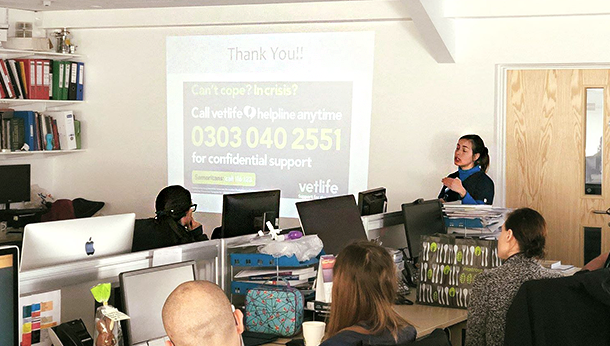Veterinarians are always the first line call when it comes to animal welfare. There is a growing interest in reducing pet’s stresses when they are brought into a veterinary practice. However, there is little public knowledge about the stress that the veterinary staff face on a daily basis. Recently, there has been growing evidence that people in the veterinary profession suffer from high levels of stress, depression and anxiety. The rate of suicide amongst this industry is four times higher than the general population, and two times higher than any other healthcare profession.
Why is this happening?
Many theories have been proposed. It was initially believed that the easy access and knowledge of means of suicide, as well as the different approach to euthanasia, made vets particularly vulnerable to suicide. In fact, self-poisoning is the most common choice. However, even when self-poisoning cases are excluded, the rate of suicide within this profession remains considerably high. More recent studies have shown that people attracted by this profession have particular characteristics, such as perfectionism, high level of anxiety and self-criticism, that would make them more prone to suicidal thoughts.
From the very first day of university, the pace and amount of learning puts those who wish to enter the veterinary profession under a significant level of stress, which will only worsen after graduation. As newly qualified vets, they have to work long hours, overnight, during weekends and bank holidays, and it becomes very easy to lose their work-life balance.
Performing euthanasia has been reported as a major stressor by many vets and this practice may lead many to develop compassion fatigue. This is the state of emotional exhaustion due to multiple emotive stresses or a single traumatic event. For many veterinarians this might come with burnout, which is a physical and mental exhaustion due to longstanding excessive workload.
Although the vast majority of vets are now aware of these figures, there is still a perceived stigma and an unspoken fear around mental wellbeing which prevents people from seeking professional help.
So why do so many in the veterinary industry remain in the profession despite all these stressing factors? The reason is because of the ability to deeply care and wanting to make a real difference, importantly to help the beloved pets as much as possible. The majority of vets reported that the sense of purpose and satisfaction that derives from their job outweighs the stressors associated with the profession. However, it is still important to look after ourselves. It is important those in the veterinary industry develop resilience and the mental ability to recover from traumatic events. To find a good work-life balance, as well as build emotional intelligence. To learn how to maintain a mental detachment from our patients, but still keeping passion and care for our patients.
Wellbeing at Southern Counties Veterinary Specialists
At Southern Counties Veterinary Specialists (SCVS), mental wellbeing is important to us. We have a dedicated wellbeing team on site with caring members whom anyone in the practice can always feel safe talking to. The members are all trained as wellbeing champions.
Joanne Tuck, our Health and Safety Officer at SCVS is trained in mental health first aid and shared her knowledge on wellbeing: “It’s about raising awareness and realising that it is as important to look after your mental health as well as your physical health. We need to learn and recognise the signs of people who are under stress and act on it. It’s about improving our listening skills in order to assess the information they are telling you and seeing beyond the usual ‘I’m okay’. If people don’t talk about problems they can escalate. It is also important to have people who will listen without judgement, which is our role in the wellbeing team. We need to have measures in place before their wellbeing decreases such as creating and following an action plan.”
She gives a wonderful metaphor: “Mental wellbeing is like walking through a beautiful park and getting to the end of the walk without having noticed any of it, because your mind is full of the problems of the day. So it is important to stop, breathe deeply, think and look around you.”
SCVS veterinary intern, Katia Dei gave a powerful presentation about mental wellbeing last month to help educate those working here on their own wellbeing and how to stay on top of it. She presented a seminar in front of her peers and those who attended left with plenty to discuss around it.

Katia Dei presenting wellbeing to her peers at Southern Counties Veterinary Specialists.
Our five important steps to wellbeing at SCVS are:
- Keep Learning
- Be active
- Take notice
- Give
- Connect
For veterinary wellbeing support call Vetlife on 0303 040 2551 and for any support call Samaritans on 116 123.